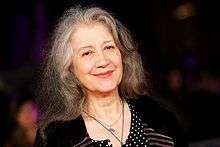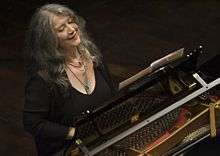Martha Argerich
Martha Argerich (Spanish pronunciation: [ˈmaɾta aɾxeˈɾitʃ]; born June 5, 1941) is an Argentine/Swiss classical concert pianist. She is considered to be one of the greatest pianists of the recorded era.[1]
Martha Argerich | |
|---|---|
 Argerich in 2015 | |
| Background information | |
| Born | June 5, 1941 Buenos Aires, Argentina |
| Genres | Classical |
| Occupation(s) | Pianist |
| Instruments | Piano |
Early life and education

Argerich was born in Buenos Aires, Argentina.[2] Her paternal ancestors were Spanish Catalans based in Buenos Aires since the 18th century. Her maternal grandparents were Jewish immigrants from the Russian Empire, who settled in Colonia Villa Clara in the Entre Ríos province—one of the colonies established by Baron de Hirsch and the Jewish Colonization Association.[3][4] The provenance of the name Argerich is Catalonia, Spain. She started playing the piano at age three. At the age of five, she moved to teacher Vincenzo Scaramuzza, who stressed to her the importance of lyricism and feeling. Argerich gave her debut concert in 1949 at the age of eight.
The family moved to Europe in 1955, where Argerich studied with Friedrich Gulda in Austria. She later studied with Stefan Askenase and Maria Curcio.[5] Argerich also seized opportunities for brief periods of coaching with Madeleine Lipatti (widow of Dinu Lipatti), Abbey Simon, and Nikita Magaloff.[6] In 1957, at sixteen, she won both the Geneva International Music Competition and the Ferruccio Busoni International Competition within three weeks of each other. It was at the latter that she met Arturo Benedetti Michelangeli, whom she would later seek out for lessons during a personal artistic crisis at the age of twenty when she considered giving up music to train as a doctor [7], though she only had four lessons with him in a year and a half.[8][9] Her greatest influence was Gulda, with whom she studied for 18 months.
Professional career
Argerich performed her debut concert at the age of 8, playing Mozart's Piano Concerto No. 20 in D minor and Beethoven's First Piano Concerto in C major.[10] Argerich rose to international prominence when she won the seventh International Chopin Piano Competition in Warsaw in 1965, at age 24. In that same year, she debuted in the United States in Lincoln Center's Great Performers Series. In 1960, she had made her first commercial recording, which included works by Chopin, Brahms, Ravel, Prokofiev, and Liszt; it received critical acclaim upon its release in 1961. She has since recorded works by many composers, including Ginastera, Rachmaninoff and Schumann, whom she describes feeling a particular connection to. [11]

Argerich has often remarked in interviews of feeling "lonely" on stage during solo performances.[12] Since the 1980s, she has staged few solo performances, concentrating instead on concertos and, in particular, chamber music, and collaborating with instrumentalists in sonatas.
Argerich has also promoted younger pianists, both through her annual festival and through her appearances as a member of the jury at international competitions.[13][14][15] The pianist Ivo Pogorelić was thrust into the musical spotlight partly as a result of Argerich's actions: after he was eliminated in the third round of the 1980 International Chopin Piano Competition in Warsaw, Argerich proclaimed him a genius and left the jury in protest.[16] She has supported several artists including Gabriela Montero, Mauricio Vallina, Sergio Tiempo, Roberto Carnevale, Gabriele Baldocci, Christopher Falzone[17] and others.[18][19]
Argerich is the president of the International Piano Academy Lake Como and performs annually at the Lugano Festival.[20] She has also created and been a General Director of the Argerich Music Festival and Encounter in Beppu, Japan, since 1996.

Her aversion to the press and publicity has resulted in her remaining out of the limelight for most of her career. Nevertheless, she is widely recognized as one of the greatest pianists in history.[21][22][23][24]
Her performance of Liszt's First Piano Concerto conducted by Daniel Barenboim at The Proms 2016 prompted this review in The Guardian: "It was an unforgettable performance. Argerich celebrated her 75th birthday in June this year, but that news doesn’t seem to have reached her fingers. Her playing is still as dazzling, as frighteningly precise, as it has always been; her ability to spin gossamer threads of melody as matchless as ever. This was unmistakably and unashamedly Liszt in the grand manner, a bit old-fashioned and sometimes even a bit vulgar at times, but in this of all concertos, with Barenboim and the orchestra following each twist and turn, every little quickening and moment of expressive reflection, it seemed entirely appropriate."[25]
Argerich returned to the Proms at the age of 78 in 2019 to perform Tchaikovsky's First Piano Concerto under the baton of Barenboim, a performance described as mesmerizing.[26]
Personal life
| External audio | |
|---|---|
Argerich has been married three times. Her first marriage, to composer-conductor Robert Chen (Chinese: 陈亮声; pinyin: Chén Liàngshēng),[27] and with whom she had a daughter, violist Lyda Chen-Argerich,[28] ended in 1964.[29] From 1969 to 1973, Argerich was married to Swiss conductor Charles Dutoit, with whom she had a daughter, Annie Dutoit. Argerich continues to record and perform with Dutoit. In the 1970s she was also briefly married to pianist Stephen Kovacevich,[30] with whom she has a daughter, Stéphanie.[29] Although they made few recordings together during their marriage, Argerich and Kovacevich still frequently perform together. [31]
Argerich is a polyglot and has lived in Belgium, Switzerland (where she has citizenship) and France.[32]
In 1990, Argerich was diagnosed with malignant melanoma. After treatment, the cancer went into remission, but there was a recurrence in 1995, eventually metastasizing to her lungs and lymph nodes. Following an experimental treatment at the John Wayne Cancer Institute in Santa Monica pioneered by oncologist Donald Morton, Argerich's cancer went into remission again. In gratitude, Argerich performed a Carnegie Hall recital benefiting the Institute.[33] As of 2020, Argerich remained cancer-free.[34]
Media
In 2002, director Georges Gachot released Martha Argerich, Evening Conversation, a documentary film about Argerich.[35] Stéphanie Argerich Blagojevic directed a documentary film about her mother, Bloody Daughter, based on film shot since her childhood.[36]
Awards
- Ferruccio Busoni International Piano Competition: 1st prize (1957)[37]
- Geneva International Music Competition: 1st prize (1957)
- International Frédéric Chopin Piano Competition: 1st prize (1965)
- Claudio Arrau Memorial Medal (1997)
- Diamond Konex Award 1999 as the most important Classical Musician of the decade in Argentina.
- Grammy Award for Best Instrumental Soloist(s) Performance (with orchestra)
- Charles Dutoit (conductor), Martha Argerich and the Montreal Symphony Orchestra for Prokofiev: Piano Concertos Nos. 1 and 3/Bartók: Piano Concerto No. 3 (2000)
- Grammy Award for Best Chamber Music Performance:
- Martha Argerich and Mikhail Pletnev for Prokofiev (Arr. Pletnev): Cinderella Suite for Two Pianos/Ravel: Ma Mere L'Oye (2005)
- The Order of the Rising Sun, Gold Rays with Rosette 2005 Japan
- Praemium Imperiale 2005 Japan
- Grammy Award for Best Instrumental Soloist(s) Performance (with orchestra):
- Claudio Abbado (conductor), Martha Argerich and the Mahler Chamber Orchestra for Beethoven: Piano Concertos Nos. 2 & 3 (2006)
- Voted into Gramophone's Hall of Fame in 2012.[38]
- Recipient of The Kennedy Center Honors in 2016.[39]
- Recipient of Order of Merit of the Italian Republic in 2018.[40]
Videography
- New Year's Eve Concert 1992: Richard Strauss Gala, conducted by Claudio Abbado, Kultur Video DVD. D4209, 2007
Discography
- Martha Argerich & Friends: Live from Lugano Festival (2015)
See also
References
- "The 20 Greatest Pianists of all time | Classical-Music.com". www.classical-music.com.
- Tommasini, Anthony (2000-03-25). "An Enigmatic Pianist Reclaims Her Stardom". The New York Times. ISSN 0362-4331. Retrieved 2016-02-04.
- "La vida de una pianista única: "Martha Argerich" por Moshé Korin". Lavozylaopinion.com.ar. Archived from the original on 2013-08-01. Retrieved 2013-10-21.
- "Portrait : Martha Argerich - Arts-Scènes". Owl-ge.ch. Retrieved 2013-10-21.
- Niel Immelman (14 April 2009). "The Guardian, 14 April 2009". Guardian. London. Retrieved 2012-01-04.
- Manildi, Donald Musician of the Year 2001 Martha Argerich, "Musical America", 2001
- https://www.capradio.org/music/classical/2017/08/07/artist-of-the-week-martha-argerich/
- Elder, Dean. Excerpts from a Rare Interview with Argerich. accessed 19 January 2010.
- Andrew Clark (2011-07-08). "Strains of mood music". Financial Times. Retrieved 2015-07-24.
- "Martha Argerich (Piano) - Short Biography". Bach-cantatas.com. Retrieved 19 November 2017.
- "Bloody Daughter"
- "YouTube". YouTube. Retrieved 2013-10-21.
- "About". Chopin International Competition. Archived from the original on 7 July 2013. Retrieved 17 January 2014.
- "Jury". ASU Competition. Archived from the original on 21 May 2014. Retrieved 17 January 2014.
- "Ninth Competition". Arthur Rubinstein Competition. Archived from the original on 30 September 2013. Retrieved 17 January 2014.
- Stevenson, Joseph. Allmusic Biography of Ivo Pogorelich accessed 18 January 2010
- "Classicalrecitals". YouTube. 2009-11-03. Retrieved 2015-09-04.
- "Progetto Martha Argerich" (in Italian). Rsi.ch. Archived from the original on 2011-10-06. Retrieved 2012-01-04.
- "Progetto Martha Argerich" (in Italian). Rsi.ch. Archived from the original on 2010-12-30. Retrieved 2012-01-04.
- "Progetto Martha Argerich" (in Italian). .rsi.ch. Archived from the original on 2015-11-04. Retrieved 2015-09-04.
- Ross, Alex (12 November 2001). "Madame X". The New Yorker. Retrieved 15 January 2014.
- Tommasini, Anthony (20 March 2005). "Classical Music: Recordings; Boisterous Beethoven, Brooding Brahms". The New York Times. Retrieved 15 January 2014.
- Carrizo, Rodrigo (2013-01-24). "Examining a Martha-daughter relationship - SWI". Swissinfo.ch. Archived from the original on 2015-09-24. Retrieved 2015-09-04.
- In a 2001 article about Martha Argerich for The New Yorker, critic Alex Ross wrote: "Argerich brings to bear qualities that are seldom contained in one person: she is a pianist of brain-teasing technical agility; she is a charismatic woman with an enigmatic reputation; she is an unaffected interpreter whose native language is music. This last may be the quality that sets her apart. A lot of pianists play huge double octaves; a lot of pianists photograph well. But few have the unerring naturalness of phrasing that allows them to embody the music rather than interpret it."
- "West-Eastern Divan Orchestra/Barenboim/Argerich review – extraordinary in every respect". The Guardian. 2016-08-18. Retrieved 2016-11-15.
- Clements, Andrew (August 13, 2019). "Prom 34: West-Eastern Divan Orch/Barenboim/Argerich review – immaculate and mesmerising" – via www.theguardian.com.
- "二十八国华人演奏家"百鸟还巢"". News.163.com. Archived from the original on 2013-10-21. Retrieved 2012-12-11.
- "Lyda Chen-Argerich, violist". Sens Management. Retrieved July 2, 2014.
- Hauptfuhrer, Fred; Vespa, Mary (1980-04-07). "A Top Woman Pianist, Martha Argerich, Nearly Gave Up Her Steinway for Steno". people.com. Retrieved 2014-07-02.
- "Martha Argerich Speaks to Stephen Kovacevich". Gramophone.co.uk. November 2008. Retrieved 2020-07-17.
- https://www.youtube.com/watch?v=A_AVhqab1hE
- http://www.newwavefilms.co.uk/assets/976/ARGERICH_pressbook_update#:~:text=St%C3%A9phanie%20Argerich%20%2D%20DIRECTOR,of%20Design%20in%20New%20York.
- Toronto Globe and Mail, concert review, March 28, 2000
- Midgette, Anne (2016-12-01). "Martha Argerich is a legend of the classical music world. But she doesn't act like one". The Washington Post. ISSN 0190-8286. Retrieved 2017-01-23.
- "Martha Argerich, conversation nocturne" – via www.imdb.com.
- Leslie Felperin (2015-04-30). "Argerich review – a daughter's honest portrait of her classical-pianist mother". The Guardian. Retrieved 2015-07-24.
- "Storia del Concorso - Fondazione Concorso Pianistico Internazionale Ferruccio Busoni". Concorsobusoni.it. Archived from the original on 2009-11-14. Retrieved 2013-10-21.
- "Gramophone Hall of Fame : Artists Page". Gramophone.co.uk. Retrieved 11 April 2012.
- "The Kennedy Center Honors". Kennedy-center.org. Retrieved 2016-08-09.
- "Concerto in onore di Zubin Mehta". Presidenza della Repubblica (Italy). 24 October 2018. Retrieved 2018-12-08.
External links

- "Argerich--Discography," (August 11, 1999)
- Ross, Alex; 'Madame X', November 12, 2001, a profile of Argerich in The New Yorker
- Martha Argerich, evening talks, the award-winning documentary film about Argerich by Georges Gachot - (imdb link)
- Orga, Ates, River Plate Queen (1978, 2006), an interview with Argerich first published in the 1979 International Music Guide
- MUSIC FESTIVAL Argerich's Meeting Point in Beppu, a music festival sponsored by the Argerich Arts Foundation of Beppu, Japan
- The Martha Argerich Project
- Argerich Music news, concert schedule, articles, recordings
- Argerich's repertoire through the years
- Martha Argerich biography, CD and concert review by cosmopolis.ch
- Martha Argerich Project Brings Talent to Lugano by Euro News, June 15, 2009